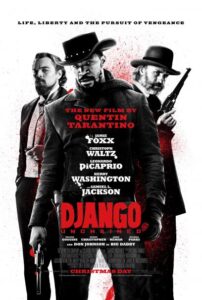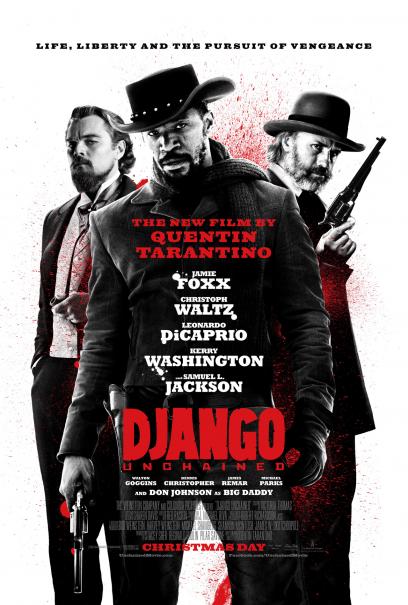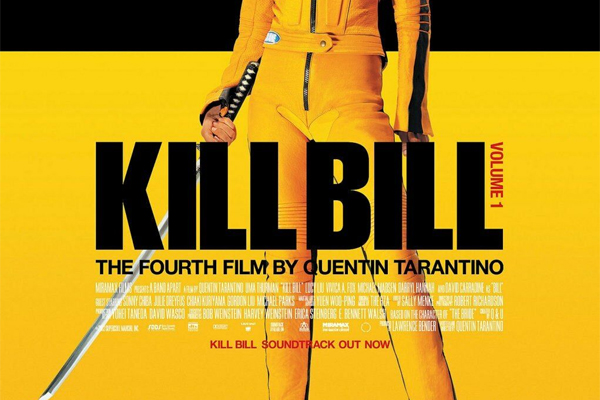Reading Time: 4 minutes
 Django Unchained
Django Unchained
4.5 / 5
IT’S BEEN ALMOST three years since Quentin Tarantino’s last film Inglourious Basterds left most of us wanting more. Luckily, whether you’re a Tarantino fan or not, Django Unchained is a stylish, entertaining, action-packed spaghetti western that showcases how talented this man really is.
The film is next to perfect and should be taking home every Golden Globe and Oscar next year, mostly thanks to an outstanding performance by Christoph Waltz. Jamie Foxx’s acting is stellar and thoroughly convincing, but at times his character is oversimplified; perhaps this was done to contrast Waltz’s multilayered role.
The only thing I question about this film is the casting of Leonardo DiCaprio, whose perpetual yearning for an Oscar is evident in his portrayal of the villain Calvin J. Candie. Every time he spoke, I felt immediately pushed out of the film by his distracting and horribly drawn-out Mississippi accent. DiCaprio looks out of place, uncomfortable, and doubtful about playing the bad-boy role. A hardly recognizable Samuel L. Jackson makes an appearance near the end of the film, which provides a perfect dose of comic relief amidst its most serious moments.
Django Unchained’s underlying themes of oppression and freedom break down traditional spaghetti western stereotypes by addressing the reality of slavery in a matter-of-fact way. In typical Tarantino fashion, this blood-bathed film is quite violent, especially toward the end, and rings in at a hefty two hours and 45 minutes. Tarantino’s knack for character development won’t disappoint, and his dialogue will satisfy those with a taste for dry humour. Add to this a stellar soundtrack and surprising cameos, and the result will leave you pleasantly indulged and gratified by perhaps the best film Tarantino has made to date.
—Jessica Eritou
 Hyde Park on Hudson
Hyde Park on Hudson
3.5 / 5MAKING A GOOD biographical film can often be a tall order, but director Roger Michell manages to harness the many subtleties of real life in Hyde Park on Hudson. The film showcases the secret love affair between Franklin D. Roosevelt and his distant cousin Margaret Stuckley (also known as Daisy) around the time the king and queen of England came to visit Hyde Park, NY in 1939.
The film is told through a retrospective monologue from Daisy’s perspective. Hyde Park on Hudson stays true to its time period and setting with its classic American cars, pastimes, and wardrobe. Bill Murray’s role as FDR is radically different from his past portrayals, and Murray shows more skill as an actor than usual. The relationships between the film’s key characters are quite complex and secretive, and the cleverly casted actors—in total control of their expressions—portray the characters extraordinarily well.
The film’s suggestive moments and cheeky humour are sure to draw you in and entertain. A word of advice, though: know your history if you want to fully grasp the more subtle nuances of Hyde Park on Hudson.
—Marley Lewington
 Scott Walker
Scott Walker
Bish Bosch | 4AD
4 / 5FEW MUSICIANS HAVE had a career like Scott Walker’s. Beginning in the 1960s as a folk singer comparable to the likes of Donovan and Bob Dylan, Walker gradually faded into obscurity before resurfacing in the ‘90s. This era saw him perform increasingly creepy, experimental music that was about as far away from folk as you can get. The new direction gave birth to a pair of releases, 1995’s Tilt and 2006’s The Drift, the latter of which is one of the few albums I feel can justifiably be classified as “horror music.”
On Bish Bosch, Walker resumes his trend of doing everything he can to make the listener as uncomfortable as possible: unsettling strings and horns, rumbling drums, occasional doom-metal guitar riffs, and the odd melodic synth line abound all over the album’s lengthy, progressive tracks. Attention should be paid to the oddball lyricism that dominates the album. One-liners such as “nothing clears a room like removing a brain” and “if shit were music, you’d be a brass band” really grab your attention, especially considering that they’re coming from a 69-year-old.
Bish Bosch isn’t all doom and gloom. Lead single “Epizootics!” is oddly danceable at times, and melody does reveal itself occasionally in tracks like the beautiful closer “The Day the ‘Conducator’ Died.” Overall, this is an album best devoured in a single sitting in order to fully appreciate its dark, avant-garde sound.
—Max Szyc
 Why?
Why?
Mumps, etc. | Anticon
3 / 5
FOR THE PAST decade, Berkeley, Calif.-based band Why? has been cleverly combining abstract hip-hop with modern indie rock under the leadership of enigmatic frontman Jonathan “Yoni” Wolf, whose angst-ridden lyricism gives Pinkerton-era Rivers Cuomo a run for his money. On its fourth full-length effort, Mumps, etc., the band proves that they’re still able to write solid songs, even if they can’t help but sound a little tired.
Wolf mostly abandoned rapping in exchange for more traditional singing on 2009’s Eskimo Snow, but he brings his former vocal style back to the forefront on Mumps, etc. Despite this, nothing here touches the creative heights of their 2008 masterpiece Alopecia, on which one cannot help but feel that they peaked.
Lead single “Sod in the Seed” is hellishly misleading; while that track contains the clever, upbeat instrumentation and the biting lyrics that Wolf does best, the remainder of the album is dominated mostly by slow and plodding tracks. They’re not all bad—songs such as “Bitter Thoughts” and “Paper Hearts” are examples of when the subdued formula works well—but the rest mostly lack the creative spark evident in “Sod in the Seed” and songs from previous albums.
I cannot write off Mumps, etc. entirely, as overall it’s an enjoyable release that’s great if you’re in the mood for something a little more quiet and ambient. But newcomers to Why? should be aware that this is nowhere near the band’s best work. Hopefully they have another masterpiece somewhere in them.
—Max Szyc
-
Fall 2023: Sydney Grenier
Spring 2022: Desiree Nikfardjam
Fall 2021: Zofka Svec
2020-2021: Aisling Murphy
2019-2020: Ryan Pepper
2018-2019: Iain Sellers
2017-2018: Ryan Pepper
View all posts
Related
 Django Unchained
Django Unchained Hyde Park on Hudson
Hyde Park on Hudson Scott Walker
Scott Walker Why?
Why?




